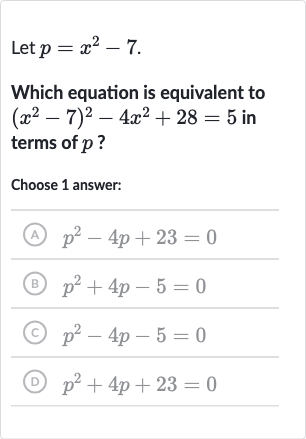Full solution
Q. Let . Which equation is equivalent to in terms of ? Choose answer:
- Substitute into equation: Given , we want to express the equation in terms of .
- Express in terms of : First, we substitute into the equation where appears:
- Distribute across terms: Now, we need to express in terms of . Since , we can rewrite as :
- Simplify by canceling terms: Next, we distribute the across the terms in the parentheses:
- Set equation to zero: The and cancel each other out, simplifying the equation to:
- Final equivalent equation: To set the equation to zero, we subtract from both sides:
- Final equivalent equation: To set the equation to zero, we subtract from both sides:We have now expressed the original equation in terms of , and the equivalent equation is:

